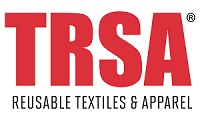Environmental Impact Study Favors Reusables

COMMERCIAL TEXTILES’ SUPERIOR SUSTAINABILITY VERIFIED
Independent Analysis Finds Lower Environmental Impact vs. Disposables
An independent study, commissioned by TRSA, the leading global textile services trade association, indicates reusable textile products (cloth) have less environmental impact when substituted for disposable counterparts (paper/synthetic) in three common commercial scenarios:
- Using a napkin in a mid-priced or upscale restaurant
- Wearing a shoulder-to-shin gown to protect clothing in a hospital
- Wiping oil, grease, solvent, chemicals and other soils in an industrial setting
The research quantifies the natural resources needed and waste generated in the manufacturing, distribution, use and disposal of various reusable and disposable versions of these products. “The findings suggest that across the wide variety of available products’ materials and weights, reusables have the lowest environmental impact throughout their normal life cycle,” explained TRSA President and CEO Joseph Ricci.
Results of this product life cycle assessment reinforce TRSA members’ longstanding competitive advantage over disposables manufacturers due to the favorable economics of textile reuse and commercial laundering. Now reusables’ lower environmental impact can be added to the case that they are the more sustainable option for businesses.
For isolation gowns and wipers, the assessment found that regardless of product weight, resource consumption or waste, a disposable always contributes more to global warming than its reusable equivalent. Even the most resource-conservative and least wasteful disposables have a greater impact than the worst reusables.
In the case of napkins, a single use of a heavier, intensely washed reusable (usually found in mid-priced or upscale restaurants) has significantly less impact than a single heavier disposable. A single, smaller disposable with recycled content (fast food) has slightly less impact than a single use of a lighter reusable. But when fast-food patrons use multiple disposables in a meal, that thin margin disappears.
According to the study, disposables’ impacts are driven primarily by raw materials, followed by manufacturing energy. Reusables’ impacts are dominated by laundering and, to a limited extent, by raw materials production.
“This is solid evidence that across the board, the combined water, energy and chemical impact of commercial laundering and reusable textile service intrudes less on our planet than the same impact from manufacturing, transport and use of disposables,” Ricci said. “While no study using broad parameters can take into account every possible substitution, it’s clear that in scenarios where the two compete most closely, reusables prevail.”
The independent study was conducted by Exponent, an engineering and scientific consulting company that offers multidisciplinary teams of scientists, physicians, engineers and regulatory consultants to perform in-depth scientific research and analysis across a range of industries.
ABOUT TRSA
TRSA (www.trsa.org) represents the $16 billion textiles services industry which employs 200,000+ people at 1,500+ facilities nationwide by advocating for fair regulatory and legislative policy affecting the textile services industry and promoting the environmental benefits of reusable textiles. TRSA increases productivity, sustainability, safety and professionalism through education, certification, research, benchmarking and information-sharing. Most Americans benefit at least once per week from the cleanliness and safety of laundered, reusable linens, uniforms, towels, mats and other products provided to the service, industrial/manufacturing, hospitality, restaurant and healthcare sectors. TRSA quantifies our industry’s commitment to cleanliness and sustainability through its Clean Green and Hygienically Clean Certification programs.
Release date: 08/19/2014
Contact: Jerry Martin, V.P. of Sales & Marketing (949) 996-8976
Source: TRSA - ALEXANDRIA, Va., Aug. 19, 2014
By: Ken Koepper, Director of Marketing/PR - 703.519.0029, ext. 109
